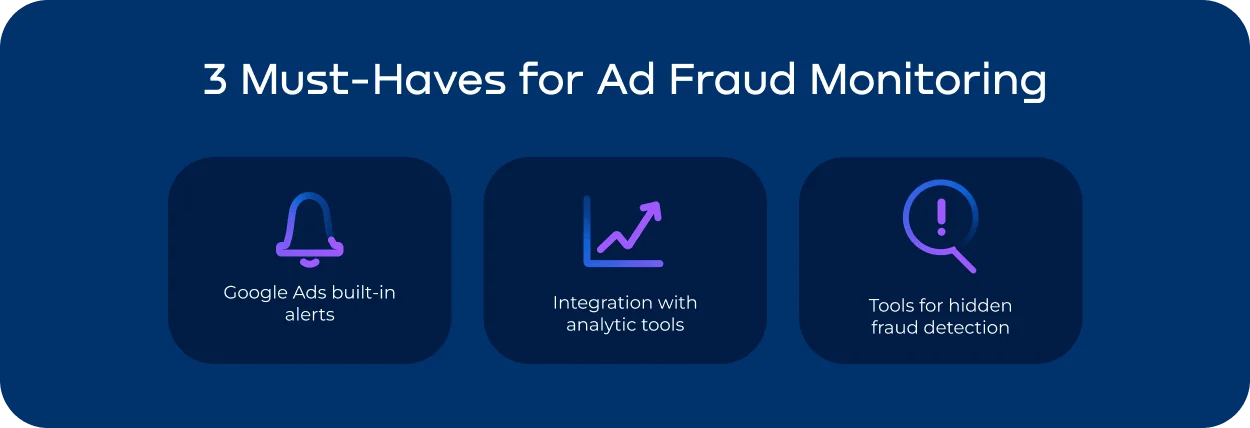
Contents
According to a 2026 industry analysis, 20.64% of global ad impressions show invalid traffic characteristics, meaning more than 1 in 5 impressions may be non-human or fraudulent (Fraudlogix).
Another report found that $63 billion in global digital ad spend was wasted on bot traffic and ad fraud across platforms from August 2024 to August 2025 (Lunio).
This data shows that ad fraud is becoming an increasingly serious threat for brands advertising on major platforms like Google Ads. And it’s not just about wasted clicks — it’s about distorted metrics and unseen activity that actively drains advertising budgets.
This guide on Google Ads fraud detection is designed to help marketers leverage analytics to protect their campaigns from Google Ads fraud from common scam schemes.
How Google Ads Fraud Works
Fraud takes many forms, each with unique mechanisms and consequences. Fraudulent activity often mimics legitimate traffic, making detection harder, especially when it comes to manual checks. By breaking down common types of fraud, brands can recognize the patterns and take targeted preventive measures.
Types of Google Ads Fraud
- Click fraud occurs when competitors or malicious actors set bots to repeatedly click on ads to drain your ad budget. Click fraud can inflate cost-per-click and distort ROI metrics, leading to wrong marketing decisions and wasted ad spend.
- Invalid traffic refers to automated or non-human interactions with ads. This can include bots, scrapers, or click farms generating fake impressions and clicks. Even if conversions appear low, invalid traffic can skew analytics, mislead optimization decisions, and increase marketing costs.
- Cookie stuffing is a result of malicious actors placing multiple affiliate cookies on users’ devices without consent, leading to false commission attribution in affiliate networks.
- Retargeting fraud involves manipulating retargeting pixels to generate fake conversions that look like real user activity. It leads to wrong attribution and misleading performance analysis.
- Click injection (on mobile) refers to simulating clicks or fake installs that generate false attribution. This influences the accuracy of mobile performance tracking and ROI measurement.
- Brand bidding means bidding on another company’s brand keywords to capture or divert traffic. It’s not illegal, but most affiliate programs strictly forbid it, so it’s important to monitor when working with affiliates.
How Fraud Impacts Your Ad Campaigns
Google Ads fraud drains budgets and distorts the data marketers rely on to make strategic decisions. Roughly $37 billion of advertiser dollars may be at risk annually due to invalid traffic alone (Fraudlogix).
On top of direct financial losses, even small amounts of invalid traffic or click fraud can inflate metrics, giving the false impression of campaign performance. Over time, this leads to skewed reports, misallocated budgets, and lower ROI.
The table below shows examples of metrics that can be affected by fraudulent activity.
| Metric | Effect on Decision-Making |
|---|---|
| Click-through rate (CTR) | Misleading optimization choices |
| Cost per click (CPC) | Overspending without ROI improvement |
| Conversion rate | False sense of campaign efficiency |
| Budget utilization | Ad scheduling disrupted |
Let’s look at examples of fraud schemes and how they affect ad campaigns.
Example of a typical Google Ads scam based on click fraud:
-
A fraudulent actor sets up bots to repeatedly click on your ads multiple times per day.
-
Your CPC rises, but conversions remain flat.
-
Your budget is quickly drained before the ads reach actual potential customers.
-
Performance metrics look normal at first glance, making detection difficult without detailed review.
Example of affiliate Google Ads fraud:
-
An affiliate runs ads for your products using branded keywords and hides them from manual checks through geo-targeting and redirects.
-
Users click the affiliate links.
-
The affiliate claims commissions for these conversions.
-
Your data shows leads linked to that affiliate, so you continue paying commissions.
-
But the leads turn out to be low quality as they’ve come from locations you don’t provide your services in.
-
Your ROI gets lower, and your team wastes time on leads that don’t convert to actual sales.
How to Detect Google Ads Fraud

Google Ads fraud detection requires combining reporting metrics and analytics insights.
Let’s start with a checklist of warning signs:
-
• Sudden spikes in impressions or clicks without a corresponding lift in conversions
-
• Abnormal conversion patterns across campaigns or ad groups
-
• Geographic or device anomalies that don’t match target audiences
-
• Poor lead quality from specific sources
-
• High bounce rates and short session durations on landing pages
-
• Unexpected chargebacks or refund requests Вот таблица в Markdown формате:
| Signal | What to Monitor | Red Flag Example |
|---|---|---|
| Click-through rate (CTR) | Sudden spikes or drops | CTR doubles in 24 hours without reason |
| Conversion rate | Deviations from baseline | Conversion rate falls below 1% |
| Invalid clicks | Count flagged by Google Ads | High proportion of invalid clicks |
| Geographic distribution | Compare with targeted regions | Sudden traffic from unexpected countries |
| Device or browser types | Cross-check with normal user behavior | Unusual mobile/desktop ratio |
| Lead quality | Track engagement or form completion | Leads lack contact info or are duplicates |
The Basic Steps for Spotting Fraud
Use this Google Ads fraud detection checklist once a month to identify early signs of Google Ads fraud:
-
- Review spend and performance baselines: Compare current month metrics against historical averages (CTR, CPC, CPA). Flag any sharp deviations and pay special attention to campaigns with declining conversions.
-
- Analyze invalid clicks and interactions: Check Invalid clicks and Invalid interactions reports in Google Ads.
-
- Audit click-through rate: Pay attention to sudden CTR spikes, especially on non-brand or broad keywords.
-
- Validate conversion quality: Review bounce rate, session duration, and form completion on landing pages. Compare conversion volume with actual sales or qualified leads.
-
- Check geographic traffic distribution: Compare traffic locations with your actual target regions. Flag sudden increases from countries or regions you do not serve.
-
- Review device and OS patterns: Check unusual OS or browser distributions that don’t match your audience.
-
- Inspect time-based click patterns: Take note of suspicious activity during off-business hours.
-
- Audit search terms and brand keywords: Identify unauthorized ads, affiliates, or competitors bidding on your brand with the help of specialized tools like Bluepear.
-
- Evaluate Performance Max separately: Compare PMax performance against Search and Display campaigns. Monitor lead quality, not just conversion volume.
-
- Review placements and networks: Exclude consistently underperforming placements, MFA sites, low-quality apps, and suspicious domains.
-
- Cross-check with external analytics: Align Google Ads data with GA4 or other analytics platforms.
-
- Document and act: Log all suspicious patterns, campaigns, and data anomalies. Apply exclusions (geo, IP, devices) where appropriate.
Ad Fraud Detection Tools
A standard Google Ads report is great for basic Google Ads fraud detection, but it often misses more sophisticated schemes. Competitors, bots, cloaked campaigns, and hidden redirects operate and evolve at a speed that simple dashboards cannot keep up with.
An effective monitoring effort requires these main components:
-
• Google Ads alerts for spotting invalid clicks, unusual spending, and other anomalies flagged by Google.
-
• Analytics integrations for cross-checking Google Ads data with GA4 or any other analytical tools that you use.
-
• Specialized tools for detecting hidden fraud such as cloaking, hidden ads, or unauthorized brand bidding.
A specialized compliance and brand bidding monitoring tool can complement Google Ads reports, providing visibility into hidden threats to branded traffic. Try integrating Bluepear into your workflow, so you can detect hidden fraud early and take preventive measures before budgets are affected. By bypassing the tactics fraudsters use to conceal their actions, Bluepear surfaces suspicious patterns that would otherwise remain invisible in standard reports.

How to Prevent Ad Fraud
A strong prevention strategy combines clean campaign setup, structured tracking, and continuous monitoring with Google Ads fraud detection tools.
A well-configured campaign significantly reduces exposure to fraud. While no setup can eliminate risk entirely, the following practices create strong first-line defenses:
-
• IP Exclusions. Exclude IP addresses associated with suspicious or repetitive behavior. This is especially effective when fraudulent clicks originate from known networks or competitors. Regularly update exclusion lists, as fraud patterns change over time.
-
• Geo-Targeting Controls. Sudden spikes in clicks from non-typical locations often signal invalid traffic. Limit ad delivery to regions that align with your actual customer base.
-
• Device Filtering. Analyze performance by device type. Unusual spikes in mobile or desktop traffic without matching conversions can indicate automated activity. Adjust bids or exclude underperforming device categories when necessary.
Reviewing search performance data on a regular basis allows you to spot unusual changes in impressions, click distribution, or keyword-level behavior that may signal fraud.
Performance Max
PMax campaigns rely heavily on automation, cross-channel delivery, and broad audience expansion. While this approach helps scale reach, it also reduces transparency and limits advertisers’ ability to see where and how their ads are actually being served.
PMax introduces several fraud-related risks:
- **•**Limited placement visibility. PMax consolidates placements across Search, Display, YouTube, Discover, and Gmail into a single campaign. Advertisers cannot easily audit individual sites, apps, or placements where ads appear, allowing fraudulent inventory to blend into aggregated performance data.
- • Broad audience expansion. PMax prioritizes scale over precision, which increases exposure to low-intent or non-human traffic, especially in Display and YouTube environments.
- • Delayed fraud signals. Invalid traffic often doesn’t trigger immediate red flags in PMax metrics. Campaigns may look efficient on the surface while accumulating wasted spend over time.
- • Attribution distortion. Automated attribution can mask fraud by reallocating conversions across touchpoints, making it harder to trace anomalies back to their true source.
That’s why structured tracking, consistent audits, and external Google Ads fraud detection tools are critical for brands running PMax at scale. Without independent visibility and cross-checks, fraudulent activity can persist undetected, gradually eroding ROI and misleading optimization decisions.
Best practices for PMax:
-
• Segment conversions by campaign type and traffic source
-
• Track post-click behavior to evaluate lead quality, not just volume
-
• Compare PMax performance against search and display campaigns to spot inconsistencies
-
• Align Google Ads data with external analytics to validate conversions
Monitoring Hidden Threats
Not all fraud is visible in a standard Google Ads report. Some of the most damaging threats operate below the surface and are specifically designed to blend into “normal” performance data.
Without specialized monitoring, these issues can persist for weeks or months without triggering obvious alerts:
-
• Cloaking and redirect-based abuse involves showing different content to Google’s crawlers and real users. Fraudsters may present compliant landing pages for ad approval while silently redirecting real traffic to misleading, low-quality, or policy-violating destinations.
-
• Brand bidding violations are another hidden threat. Competitors or affiliates may bid on branded keywords, inflating CPCs and diverting high-intent traffic.
-
• Affiliate and partner compliance abuse is especially difficult to spot through campaign metrics alone. Affiliate marketing analytics show that 43% of all invalid traffic is attributed to affiliate networks (mFilterIt). This traffic may look legitimate in terms of clicks and sessions, yet originate from unauthorized placements, prohibited ad copy, misleading incentives, or unapproved intermediaries.
-
• Hidden ad placements can also drain budgets quietly. Ads may appear on low-quality apps, MFA (made-for-advertising) sites, or parked domains that generate volume without intent. Because PMax and Display campaigns aggregate placements, these sources are often masked inside overall performance numbers.
-
• Geo and device manipulation is another subtle tactic. Fraudsters route traffic through proxies or emulators to mimic “safe” geographies and devices, making abnormal patterns harder to identify when reviewing location or device reports at a high level.
To uncover these blind spots, brands need tools built specifically for monitoring hidden threats. Like Bluepear — an automated monitoring tool that spots every trademark violation, detecting hidden ads, and delivering a full report on suspicious activities in Google Ads. A free trial version of Bluepear is available to all new users — give it a try.

How to Audit Google Ads Reports
If analyzed correctly, Google Ads reports are very effective for Google Ads fraud detection. A timely audit can reveal click fraud, invalid traffic, or budget manipulation before they do irreparable damage. Here’s how to extract, analyze, and cross-check Google Ads data to identify suspicious behavior early.
Step 1: Export the Right Reports
Start by exporting raw data from Google Ads rather than relying solely on dashboards. Focus on:
-
• Campaign and ad group performance
-
• Geographic and device breakdowns
-
• Time-based data (hourly or daily)
-
• Invalid clicks and interactions
Step 2: Establish Baselines
Baselines allow deviations to stand out clearly.
Before looking for anomalies, define what “normal” looks like. Use historical averages for CTR, CPC, conversion rate, and cost per conversion. If your campaign is new and you lack historical data, use fresh industry benchmarks.
Step 3: Segment
Fraud often hides in aggregated views. Break reports down by:
-
• Campaign type (Search, Display, PMax)
-
• Network and placement
-
• Location
-
• Device type
Step 4: Cross-Check
- • Click-through rate: Sudden CTR spikes without changes in targeting can indicate automated clicks.
- • Cost per conversion: Rising costs with stable or falling conversion volume often signal invalid traffic.
- • Invalid clicks: Google flags some activity, but this data should be reviewed alongside others — not trusted blindly.
- • Conversion rate: Sharp drops may be an indication of traffic quality issues.
Conclusion
Proactive Google Ads fraud detection is the difference between reacting to losses and preventing them. Brands that rely solely on default dashboards often see clean metrics while underlying data tells a different story. Structured audits, consistent segmentation, and cross-checking key metrics make hidden patterns visible, helping you prevent ad fraud.
To protect ad budgets and maintain reliable performance, brands should adopt structured audit routines, integrate automation into monitoring workflows, and use dedicated tools designed to detect hidden fraud. This approach turns fraud detection into a continuous process — one that safeguards both spend and long-term growth.
FAQ
What are the most common Google Ads scams today?
Modern Google Ads scams include fake ads impersonating real brands, trademark abuse, and malicious redirects that drain ad budgets and mislead users.
Scammers create cloned landing pages or run deceptive ads using brand names to divert traffic. These activities result in lost conversions, inflated costs, and potential data privacy violations. Continuous monitoring is the only way to detect such fraud early.
Why isn’t Google’s own quality control enough to prevent ad fraud?
While Google has built-in security systems, they can’t catch every case of fraudulent activity — especially with AI-driven manipulation and PMax algorithm loopholes.
Recent independent research found that Google may only identify 40–60% of fraudulent clicks, leaving the rest unflagged (ClickFortify, 2026).
Fraudsters exploit automation and anonymized traffic to hide fake intent signals and generate invalid clicks. Brands need external monitoring solutions like Bluepear to independently verify ad placements, spot impersonation attempts, and collect violation evidence in real time.
How to detect and prevent Google Ads fraud effectively?
Effective protection combines automation with active monitoring:
-
• Use AI-based tools to detect suspicious traffic patterns;
-
• Set up real-time alerts for trademark use or unusual keyword activity;
-
• Implement manual audits to confirm ad legitimacy;
-
• Partner with brand protection platforms like Bluepear that specialize in ad fraud detection and reporting.
These steps reduce wasted spend and prevent reputation damage caused by fake ads.
How does Bluepear protect brands from Google Ads scams?
Bluepear continuously scans Google search results and ad networks for unauthorized use of branded keywords, trademarks, and content.
When a fake or infringing ad appears, the system instantly alerts the brand and provides documented proof — including screenshots and URLs — for rapid takedown and refund requests. By identifying impersonators before they gain traction, Bluepear helps advertisers protect their ad spend, preserve brand credibility, and maintain compliance across markets.
What proactive measures should brands take to stay protected long-term?
Consistent vigilance, supported by tools like Bluepear, ensures long-term brand safety and resilience against evolving ad fraud techniques.
-
• Regularly audit all paid campaigns for anomalies;
-
• Educate teams on recognizing phishing and ad spoofing;
-
• Use verified ad accounts and secure authentication;
-
• Integrate fraud detection and trademark monitoring tools;
-
• Report all suspicious ads promptly to Google.

